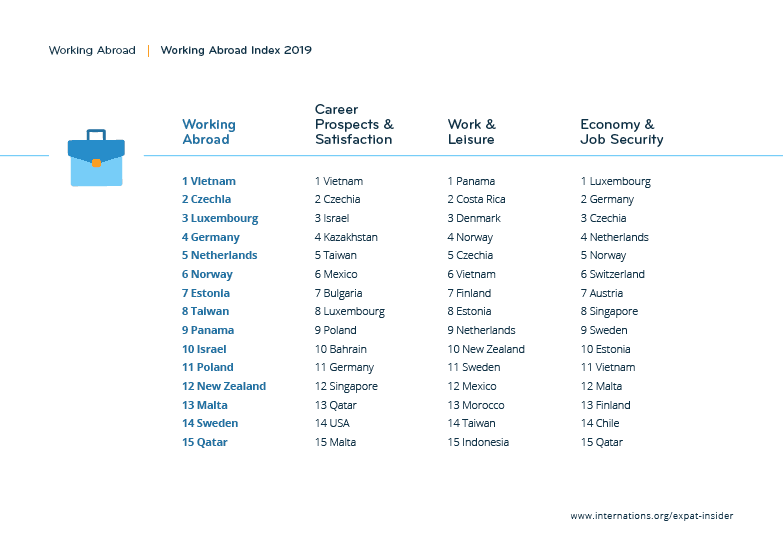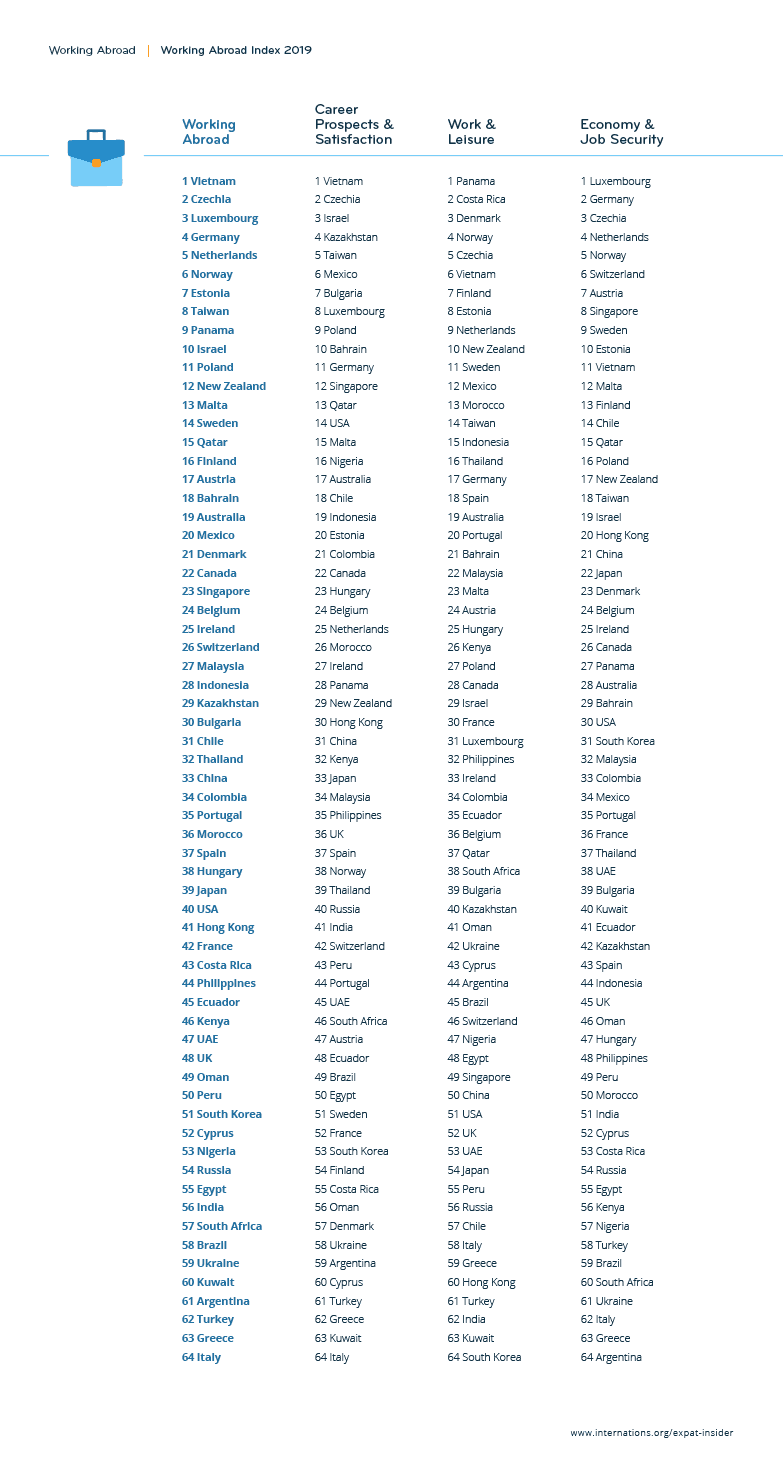Where Working Abroad Is Great for Expats Worldwide
New rising stars — and unexpected losers — emerge in 2019, highlighting where expats are happiest with all aspects of working abroad, from job security to work-life balance.
- Vietnam replaces Bahrain as the #1 country for working abroad.
- #2 Czechia maintains its ranking in the top 3 for the third year in a row.
- #3 Luxembourg reemerges in the top 3 for the first time since 2016.
- The biggest winners are Kazakhstan, Qatar, and Poland.
- The biggest losers, Ecuador, Bahrain, and Denmark, were previous big winners.
The Top 15

Methodology
The Working Abroad Index includes 64 countries — slightly fewer than the 68 countries featured in the Expat Insider 2018 survey. Each country required a minimum of 75 respondents to be included in the results, and over 45 countries had a sample size of 100 or more respondents. This index covers six rating factors in three different subcategories: Career Prospects & Satisfaction, Work & Leisure, and Economy & Job Security. Each factor was rated on a scale of 1 (very bad) to 7 (very good).
The Top 3: A Shakeup and Some Continuity
Vietnam, Czechia, and Luxembourg are 2019’s top 3 countries for working abroad, bumping Bahrain (1st in 2018) and Taiwan (2nd in 2018) out of the top spots. While Czechia has ranked among the top 3 countries for working abroad for the last three years, this is only Vietnam’s second time in the top 10. And although Luxembourg consistently features in the top 10 of the Working Abroad Index, its improvement from ranking 9th out of 68 in 2018 to 3rd out of 64 is quite a jump.
Vietnam’s first place is part of a steep upward trend in recent years: it came 32nd in this index in 2014, the first time the Expat Insider survey was conducted, and it has been rising steadily since its 36th place in 2015. Career prospects are excellent: over two-thirds (68%) are generally satisfied with their career opportunities, and 26% are even completely satisfied. Globally, these numbers are 55% and 15%, respectively. Vietnam’s most significant gains are in the Economy & Job Security subcategory, though, where it has gone from 28th to 11th in 2019.
Not only are jobs plentiful in the Southeast Asian country, with only 3% looking for work, compared to a global average of 8%, but job satisfaction is also very high — nearly three-quarters (74%) are generally satisfied with their job, which is 10 points higher than the global average. And 71% of expats are satisfied with their work-life balance (compared with 60% globally). A US American expat in Vietnam notes particularly enjoying the “work-life balance and ratio of income to cost of living”.
Ranking second in 2019 and among the top 3 every year since 2017, Czechia has been a consistent superstar for working abroad in recent years. In 2019, it even ranks in the top 5 for all three subcategories of the Working Abroad Index. For example, job opportunities are great: 68% are generally happy with their career prospects in Czechia, compared with 55% globally. Expats feel the economy is in excellent shape: 84% rate it positively (vs. a global average of 63%). And even for factors in the Work & Leisure subcategory, the rosy picture continues: over three-quarters (76%) rate their working hours favorably.
For the sixth year in a row, the number three of 2019, Luxembourg, lands in the top 10 of the Working Abroad Index. However, it’s been a while since it claimed a spot at the very top — the last time it made it into the top 3 was in 2016. With the highest GDP per capita in the EU and with the state of the economy rated positively by an impressive 96% of respondents, it is not surprising that this small European country ranks as one of the best places to work abroad.
Luxembourg is a well-balanced country. Job, friends, travel. You have it all.
Its rise from 9th place to 3rd since 2018 is reflected in the uptick in job satisfaction — the factor with the highest improvement. In 2019, there is an increase of five percentage points in this area, with nearly three-quarters (74%) being generally satisfied with their job (vs. 64% globally). A Peruvian respondent working in Luxembourg says: “It is a well-balanced country. Job, friends, travel. You have it all.”
The Biggest Winners: Kazakhstan, Qatar, and Poland
The biggest winner of 2019 is Kazakhstan (one of 2018’s biggest losers!), rising from ranking 50th to 29th in this index — it’s also one of the biggest winners overall. It performs especially well for career prospects and satisfaction, jumping from 31st to 4th place, with 58% of expats rating their career prospects positively. Job satisfaction has also improved: in 2018, 65% of expats were satisfied with their jobs, while this number has increased by seven percentage points to 72% in 2019. What’s more, expats seem to quickly settle into their jobs in Kazakhstan — 80% of expats say it took them less than six months, well above the global average of 54%. Kazakhstan’s GDP grew by 4.1% in 2018 thanks to stronger exports; positive economic growth overall may also play a role in its upward movement in this index.
Another big winner this year — and like Kazakhstan, both overall and for working abroad — is Qatar. It has advanced by 20 ranks in this index, from 35th to 15th, and shows improvement across all factors. Overall job satisfaction has climbed most substantially: in 2019, 69% of expats are generally satisfied with their jobs, up from 59% in 2018. There are similarly strong gains for the work-life balance factor, which 63% report being happy with in 2019 (slightly above the global average of 60%), compared to 53% in 2018. Experts have called Qatar’s economy one of the “best-performing” in the region, which might also be a reason why expats rate their experience working abroad there more highly in 2019.
The third-biggest winner in 2019 is Poland, advancing 15 spots to rank 11th in the index and thus only narrowly missing the top 10. Career prospects have improved most dramatically, as Poland jumps from 32nd place to 9th for this factor. In 2019, 63% of expats rate their career prospects positively, compared to only 54% in 2018. While job security in Poland received a similar share of positive ratings in 2018 and 2019, 67% and 68% respectively, the share of those who are completely satisfied is substantially higher in 2019: over a quarter of expats in Poland (26%) couldn’t be any happier, compared with only 15% in 2018.
Previous Top Performers Now the Biggest Losers
The overall lowest-ranking countries in the index, Italy (64th), Greece (63rd), and Turkey (62nd), are regularly among Expat Insider’s worst countries for working abroad. However, the countries with the sharpest decline in the Working Abroad Index, Ecuador, Bahrain, and Denmark, are quite surprising, considering the 2018 survey results.
I dislike the economy and the lack of support for smaller businesses in Ecuador.
2019’s biggest loser, Ecuador, was actually one of the biggest winners in this index in 2018. However, it has dropped 34 ranks, from 11th out of 68 to 45th out of 64. Its most staggering decline affects career prospects — where it has fallen from 2nd to 53rd in one year. A German survey respondent mentions disliking “the economy and lack of support for smaller businesses” in Ecuador. Losses are also substantial for the factors in the Work & Leisure subcategory, as well as for job security. For example, only 59% of expats in Ecuador are satisfied with their work-life balance, compared to 79% in 2018. And just 51% rate their job security positively, compared with 68% in 2018.
The picture is similarly gloomy for another top performer of 2018, Bahrain. In 2018, Bahrain was the best country for working abroad; in 2019, it’s 18th. While it has lost across all factors, the most profound decline has been in the Work & Leisure subcategory. For instance, in 2018, 81% of expats were satisfied with their working hours; this has dropped to 61% in 2019. Bahrain has been suffering since oil prices fell in 2014 and is taking various measures to boost its economy, including a new sales tax and attracting international companies, especially in the financial technology sector. An Indian survey respondent in Bahrain notes particularly disliking the “economic instability and the increase in cost of living”. Since it was recently among the top 3 in this index for two consecutive years (2017 and 2018), whether Bahrain’s decline is a one-off event or part of a long-term downward trend remains to be seen.
As a country often in the top 10 for working abroad, or close to it, Denmark’s drop from 6th spot to 21st in 2019 is also a somewhat unexpected result. While expats’ feelings about the state of the economy have remained steady, with 85% rating it positively in both 2018 and 2019, their view of their job security has declined: nearly two-thirds (65%) rated this factor positively in 2018, but in 2019, this has dropped to 57%. Despite some losses, Denmark still retains first place for working hours, as it has done since 2017. In 2019, 81% are satisfied with their working hours (vs. 62% globally). Nearly two in five (39%) are even completely satisfied (vs. 24% globally).
Full Ranking

Further Reading
- Expat Insider 2019 — The Biggest Winners & Losers
- Expat Insider 2019 — Regional Report: The GCC States
- Expat Insider 2019 — Country Report: Czechia
- Eurostat. GDP per capita, consumption per capita and price level indices. Jun 2019.
- The World Bank. The World Bank in Kazakhstan.
- Market Screener. S&P Global: Stable economy. 15 May 2019.
- Reuters. Bailed-out Bahrain has little room for maneuver in economy reboot. 18 Mar 2019.
- Bloomberg. Gulf Allies Pledge Billions in Aid for Bahrain and Jordan. 4 Oct 2018.
- Expat Insider 2018 — The Best (and Worst) Places for Working Abroad
- Expats in Vietnam
- Expats in Czechia
- Expats in Luxembourg
Advertisement
Join InterNations
The community for expats worldwide
Download

